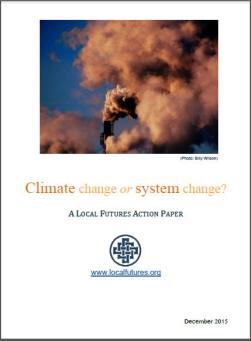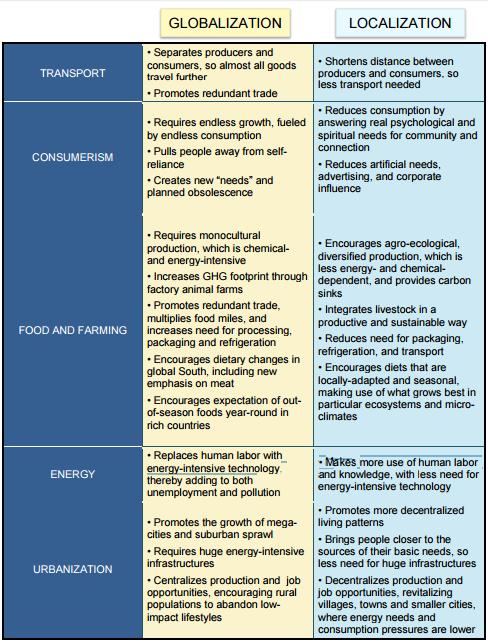
Science has established beyond doubt that the window for climate action is closing rapidly. In November 2022, Egypt will host the 27th session of the Conference of the Parties to the UNFCCC (COP27) in Sharm El-Sheikh, with a view to building on previous successes and paving the way for future ambition (UNEP).
The root causes of climate change and the most effective steps to reduce CO2 emissions were not discussed in Paris. Yet more and more people are waking up to the fact that our current corporate-driven economic model is causing havoc to the planet and to people. It is up to civil society to lead the debate and keep the pressure on governments to change the system behind climate change.
 In the wake of the Paris climate talks, Local Futures has released a 16 page action paper entitled Climate Change or System Change? (left).
In the wake of the Paris climate talks, Local Futures has released a 16 page action paper entitled Climate Change or System Change? (left).
It argues that globalization – the deregulation of trade and finance through an ongoing series of “free trade” treaties – is the driving force behind climate change.
This post is based on leads in a message we received from Local Futures’ Director Helena Norberg Hodge (right), who trained as a linguist with Chomsky and has delivered her message in English, Swedish, German, French, Spanish, Italian and Ladakhi.
 A recording of Local Futures’ first webinar, with community economist Michael Shuman and Helena Norberg-Hodge is now uploaded on YouTube.
A recording of Local Futures’ first webinar, with community economist Michael Shuman and Helena Norberg-Hodge is now uploaded on YouTube.
In this event, recognised pioneers of the localisation movement – community-economist and author, Michael Shuman and Helena – explored localisation as a systemic solution-multiplier that simultaneously lowers CO2 emissions, restores democracy and provides secure livelihoods.
The conversation identified proven strategies that strengthen local economies including the need for an international movement for localisation. See table below.
Egypt is assuming the incoming Presidency of COP 27 with a clear recognition of the gravity of the global climate challenge and appreciation of the value of multilateral, collective and concerted action as the only means to address this truly global threat. To summarise: the climate problem can only be tackled effectively if governments stop subsidising globalisation, and begin pursuing a localisation agenda instead. A golden opportunity for all stakeholders to rise to the occasion and tackle effectively the global challenge of climate change facilitated by Egypt on the African continent (Local Futures)
o